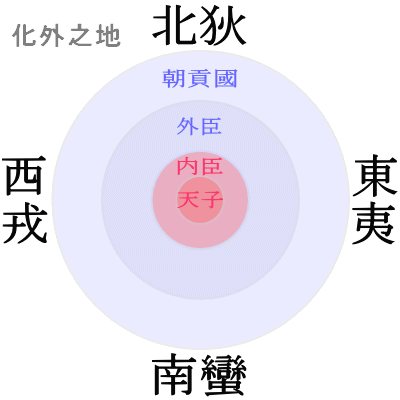Humiliation and the lost of self-confidence
Prior to the Opium War, the Chinese had always been proud of their own manifestations. Whether it was in terms of their culture, art or technology, they always saw themselves as superior and looked down on others by calling them ’savages’ (野蛮人)。

This map represents the way the Chinese Emperor positioned himself and his empire among others, as the centre of the Universe, hence the name ‘Middle Kingdom’ (中国). Other examples include Admiral Zheng He’s voyage in the 1400s where he sailed around the world to display the prowess of the Chinese fleet, giving other civilizations gifts as a sign of mercy.
What happened to all that pride then? That confidence and assuredness of one’s own nation? The empires in the vicinity all used to bow down to China; Japan, Korea, Malaya, Thailand, etc. They used to deliver gifts as a gesture of submission and respect, and China would actually return a gift that’s higher in value because China had everything she needed and didn’t need anything from anyone. That was the kind of power China used to have; the empire of empires and the envy of poorer civilizations. How many wars have been fought since the days of Qin Shihuang against the ‘barbarians’ who tried again and again to penetrate into the Chinese civilization, then called Zhongyuan (中元),to acquire the riches and assimilate the culture. Almost like a physical manifestation of this historical phenomenon, the Great Wall was built to ward off these ‘barbarians’, but it never stopped all the different minorities from finally integrating into the Chinese civilization. Don’t forget how Christopher Columbus was looking for a shortcut to China when he sailed West only to stumble upon America, and how people in Europe at that time were seduced by the vast riches and exotic culture of the Orient.
Ironically, it was this pride that caused them their humility. A change that hasn’t yet quite reversed.
Being the envy of other nations, China became complacent. They closed themselves up and never knew much about what was going outside China. Then again, they had too much to deal with internally, always putting down a rebellion or struggling against a famine. When you’re the centre of the world, you don’t worry about insignificant minorities elsewhere, which, if you think about it, sounds a bit like USA right now. And it was one of these insignificant minorities, a country that ‘wasn’t even big enough to be a province in China’, that blew apart her complacency with their superior cannons.
England made the first attack in China over opium and tea. But many nations soon followed suit, and by the time China realized what was happening, it was too late. Like a large beast that was intimidating, it was also slow and clumsy, and could not adapt to the superiority of the little mice in time. And there was the beginning of the fall of the Chinese pride. The Chinese people fell from a race that was honoured by others to a race that became despised and looked down upon. They even earned a new name, ‘The Sick of the Orient’ (东涯病夫), given by the Japanese who could finally stand up against the Chinese after centuries of bowing down to their Chinese neighbours.
As such, the Chinese people started losing faith in their own culture, deeming it as old and ancient, outdated and superstitious. Western cannons had blown up their forts, and Chinese cannons could not reach far enough to hit Western ships, and it made the Chinese think that the West was far ahead in technology. The Chinese had no natural science, no empirical method of proving scientific theories, and so they looked up to the West for their discoveries and formulae. It became a self-rejection of culture and beliefs, like how Chinese medicine had no ’scientific’ proof, according to western standards, even though it was a practice that had existed for thousands of years. Gone with the old, up with the new. It wasn’t only culture that was being rejected, but also the old political system of Emperors and lords. The collapse of the final imperial dynasty was metaphoric for the overthrow of old habits. Yes, we will become a republic. No more slaves of the Empire. We will become modern like the rest of the world and we will regain our pride.
We will become a New China.